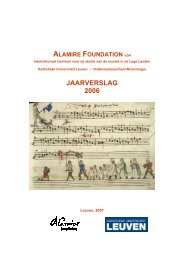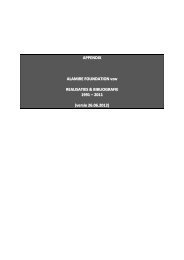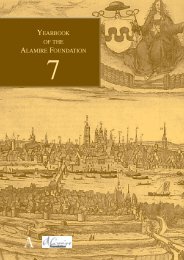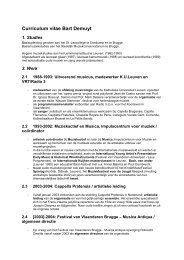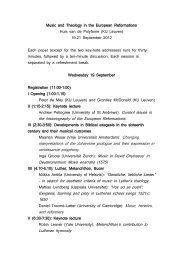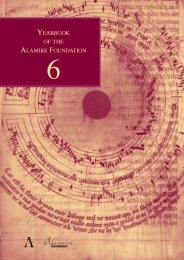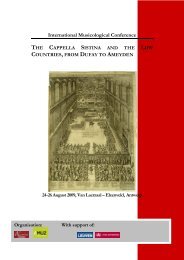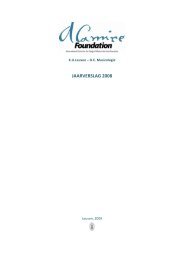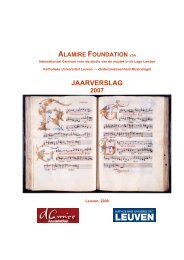programme and abstracts - Alamire Foundation
programme and abstracts - Alamire Foundation
programme and abstracts - Alamire Foundation
Create successful ePaper yourself
Turn your PDF publications into a flip-book with our unique Google optimized e-Paper software.
12<br />
Two case studies - discussing musical life in two of the most<br />
important hanseatic towns - will be presented as an illustration of<br />
both sides of this complex, but fascinating story. The town of<br />
Lübeck will be the first focal point of this lecture, with an<br />
emphasis on the history of the Abendmusiken - where the<br />
economical entity ‘Hanze’ <strong>and</strong> the cultural entity ‘music’ seem to<br />
relate to each other in a most direct way. A second point of<br />
special interest is Hamburg, where the evolutions within the<br />
history of the ‘Ratsmusikanten’ show significant parallels <strong>and</strong><br />
connections with hanseatic history.<br />
As such, this paper hopes to provide a general outline of the<br />
central topic of this conference <strong>and</strong> the Laus Polyphoniaefestival,<br />
as well as a more detailed <strong>and</strong> concrete view provided by<br />
the examples of Lübeck <strong>and</strong> Hamburg.<br />
AGNIESZKA LESZCZYŃSKA<br />
University of Warsaw, PL<br />
From Kampen via Königsberg to Gdańsk: the life of<br />
Johannes Wanning<br />
Johannes Wanning spent all of his life in hanseatic cities. Born in<br />
Kampen in 1537 <strong>and</strong> probably educated there, he left the Low<br />
Countries as a young man, maybe for economic reasons. In 1560<br />
he went to Königsberg <strong>and</strong> became employed as a singer in the<br />
chapel of Prince Albrecht. His first compositions were written<br />
there. In 1569 Wanning became a chori musici magister at the<br />
Marienkirche in Gdańsk <strong>and</strong> stayed there till his death in 1603.<br />
He was receiving wages from the City Council. Its role in<br />
supporting musicians, not only those active in Gdańsk, was very<br />
important. Wanning was compelled to adapt directives of the<br />
councillors but he knew how to force his artistic ideas. His high<br />
rank in the life of the city was testified by the fact that he was a<br />
member of the elite Reinholdsbank in the Artushof. Almost all<br />
his works - more than 100 compositions (motets, masses,<br />
occasional pieces) - originated in Gdańsk. Some of them were<br />
dedicated to the local burghers. Motet collections by Wanning<br />
were printed in Nürnberg, Dresden <strong>and</strong> Venice <strong>and</strong> probably the



